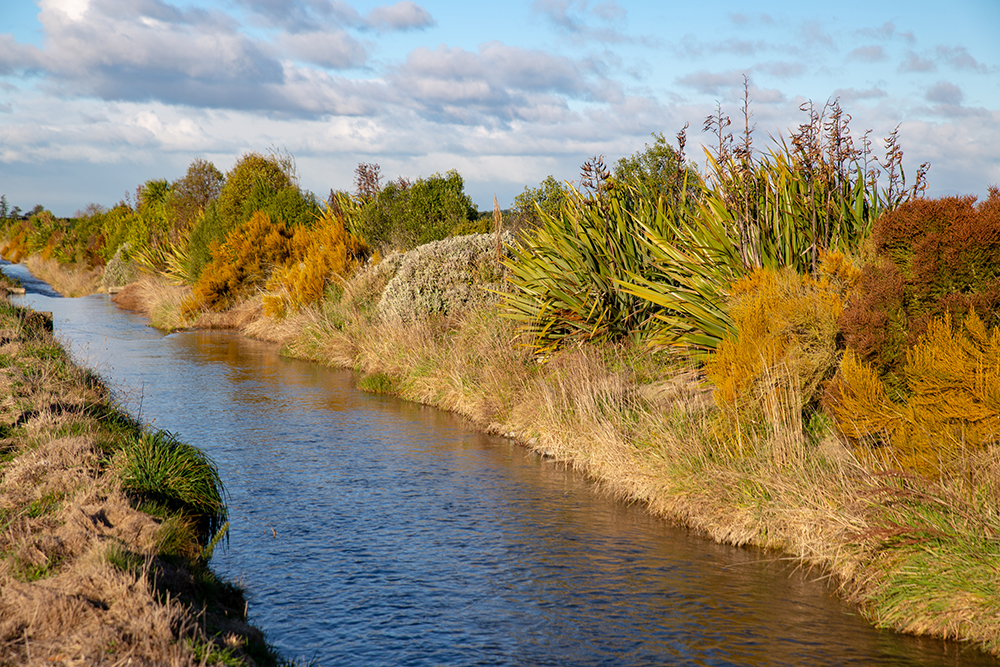A project aimed at enhancing the rural sector’s capability to improve essential freshwater on farms has been awarded funding from the Ministry for the Environment’s Essential Freshwater Fund.
Scientists from Massey University’s School of Agriculture and Environment are beginning a project to support the rural sector as they move to improve waterways on the farms.
The Catchment Solutions Tiaki Wai project is being funded with $3 million over the next three years by the Ministry for the Environment (MfE), as part of a $56 million pool of funding for the protection of lakes, rivers and streams across New Zealand.
Professor David Horne and Associate Professor Ranvir Singh will lead the project, which aims mainly to educate and provide training for farmers and iwi, including resources and educational materials, to support their on-farm work. This will include Massey’s leading research in edge-of-field technologies.
Edge-of-field solutions, where the pasture meets the waterway, are regarded as crucial for the control of potential contaminants from farmland into waterways.
Massey has developed key systems including innovative drainage management practices, woodchip bioreactors and sediment detention bunds that all seek to minimise contaminant losses that can affect the waterway ecosystem, such as sediment, nitrogen and phosphorus, from farms into rivers and streams.
The project is being launched in the Hawke’s Bay, Taranaki and Manawatū regions.
One objective is to use a river’s biological and water quality data and analysis to facilitate co-discovery, co-learning and co-innovation; where the farmers, iwi and scientists work together to develop targeted water quality mitigation/improvement practices.
The project is collaborating with three river catchment groups, including farmers, landowners and local iwi and hapū, to help identify critical contaminant flow pathways and get water samples collected and tested in their farms and waterways.
“The strength of the project lies in its collaborative approach, translating emerging water quality science, combined with targeted water sampling and testing, into practical water quality solutions and practices that farmers and landowners can use to reduce contaminant losses to waterways,” Dr Ranvir Singh says.
The project has already started working with the community and a series of workshops, field days and masterclasses have begun.
The head of the School of Agriculture and Environment, Professor Paul Kenyon, says:
“This exciting and important project is another example of our Massey team working proactively with industry and the community to ensure our environment is appropriately managed, while also ensuring New Zealand agriculture remains productive and profitable.”
The workshops, field days and masterclasses include information and practical demonstrations of water quality testing, stream health assessment, innovative drain designs, tools to map critical flow pathways from farmland, potential solutions to prevent contamination runoff and demonstrations of a newly constructed woodchip bioreactor to help treat drainage waters.
Information on classes and digital resources will be made available on the Catchment Solutions Tiaki Wai website.
About the Essential Freshwater Fund
The Essential Freshwater Fund (EFF) is worth $137 million over three years and is part of the $1.219 billion Jobs for Nature funding programme.
The EFF is a key enabler of the Essential Freshwater reforms. It is strategic investment in freshwater management that moves beyond fencing waterways and planting, and funds the filling of capability and capacity gaps so the Essential Freshwater reforms can be fully rolled out across the country.
The Essential Freshwater reforms were introduced by the Government in 2020 to stop further degradation of waterways, make material improvements and restore waterways to a healthy state within a generation.
Source: Massey University












